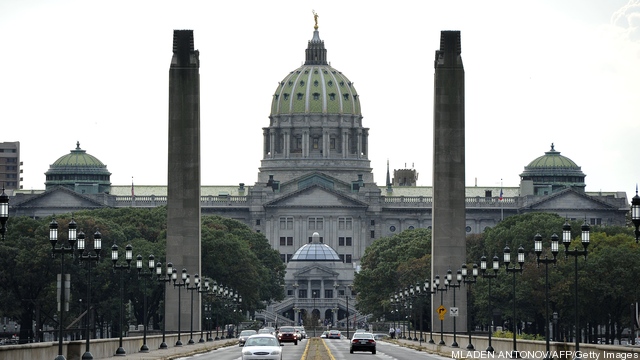
Plans to tax the booming natural gas industry in Pennsylvania were the focus of dueling bills among state lawmakers on Wednesday, with proposed tax rates varying between one and three percent of revenue from production.
A bill passed by the Republican-controlled Senate late Tuesday would tax the industry at about 3 percent, while a House amendment being debated Wednesday seeks a rate of 1 percent, which would be the lowest of any gas-producing state.
The tax, or “impact fee“, would end Pennsylvania’s status as the only gas-producing U.S. state without a tax on production, and go some way to meeting the demands of environmentalists and local communities that the energy industry should help to pay for local impacts such as damage to roads from heavy truck traffic.
Taxation of the industry – which has drilled more than 3,800 wells in the Marcellus since 2008 — was urged by former Democratic Governor, Ed Rendell, who called for a severance tax but was rebuffed by lawmakers.
Current Republican Governor Tom Corbett has staunchly opposed plans for a severance tax but has said he would consider an impact fee whose proceeds would help local communities deal with the influx of gas drillers but would not be paid into the state’s general fund.
Remembering The Jobs
Republican majorities in both houses of the legislature have sought to minimize taxation on the gas industry which is already contributing millions of dollars in state and local revenue and creating thousands of jobs in the Marcellus, one of the world’s biggest reserves of natural gas.
But with opinion polls showing most people favor of taxing the industry, Democrats and environmental groups argue that energy companies, which are expected to drill thousands more wells in Pennsylvania in coming years, should be expected to help pay for their impacts on air and water quality, roads and social services.
“This legislation will help communities impacted by drilling, provide for reasonable local zoning parameters, and implement strong environmental protections,” said Republican Sen. Joe Scarnati, who sponsored the Senate measure. “It makes sense to impose a reasonable impact fee on the industry to provide the funding necessary to further protect our natural resources.”
The Senate’s version of the fee, retroactive to 2010, would charge drillers $50,000 per well in the first year of production, going down by $10,000 in each subsequent year. The levy is expected to generate revenue of $94 million this year, $155 million next year, and $255 million by 2014.
Fifty-five percent of the revenue would go to counties and cities in the Marcellus region – which underlies about two-thirds of Pennsylvania — and 45 percent to statewide infrastructure projects, environmental programs, and other projects related to natural gas production.
The Senate bill also tightens environmental rules on the gas industry, requiring drillers to list all chemicals used at a well site; increasing penalties for environmental violations, and raising bonding fees paid by energy companies.
Still Too Small?
The House’s proposed 1 percent tax rate would be far lower than about 5 percent in neighboring West Virginia where the Marcellus industry is also surging, according to Bill Patton, press secretary to Pennsylvania House Democratic Leader Frank Dermody.
“Pennsylvania would go from being the only state that doesn’t tax gas producers, to the state with the lowest tax,” Patton said.
Environmentalists criticized the fees as too low. “I don’t think the impact fee is going to be adequate to address impacts,” wrote Myron Arnowitt, Pennsylvania State Director for Clean Water Action, in an email.
Photo Caption: The Capitol Building of Pennsylvania.
